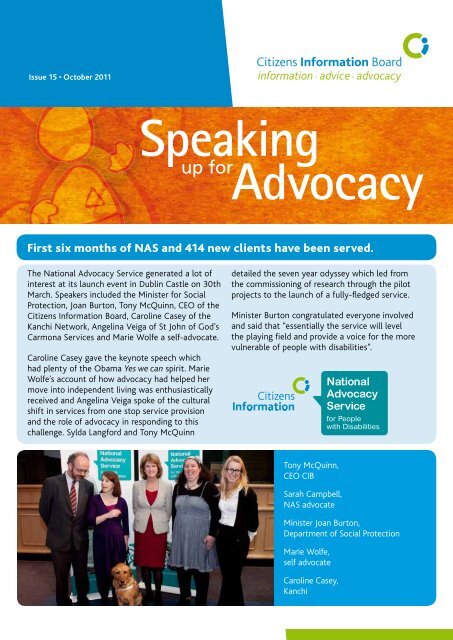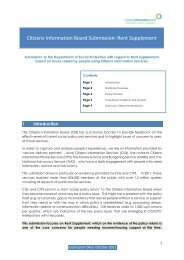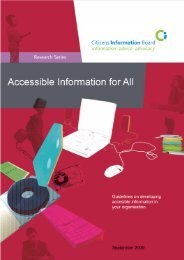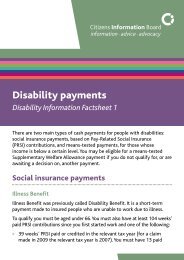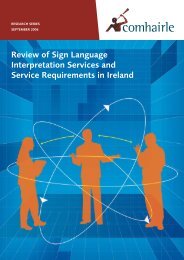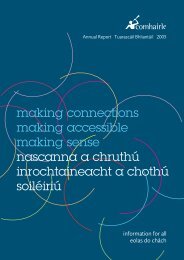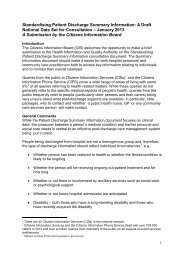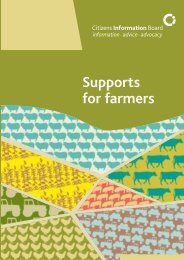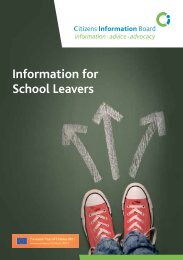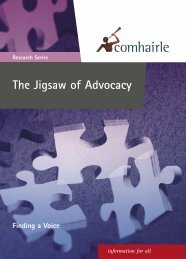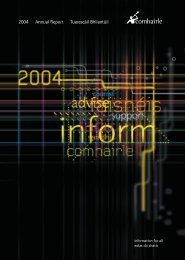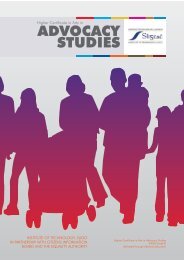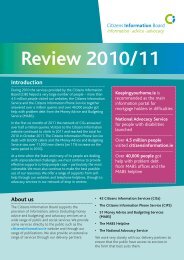Speaking up for Advocacy - Issue 15 October 2011 (pdf) - Citizens ...
Speaking up for Advocacy - Issue 15 October 2011 (pdf) - Citizens ...
Speaking up for Advocacy - Issue 15 October 2011 (pdf) - Citizens ...
You also want an ePaper? Increase the reach of your titles
YUMPU automatically turns print PDFs into web optimized ePapers that Google loves.
<strong>Issue</strong> <strong>15</strong> • <strong>October</strong> <strong>2011</strong><br />
<strong>Speaking</strong><br />
<strong>up</strong> <strong>for</strong><br />
<strong>Advocacy</strong><br />
First six months of NAS and 414 new clients have been served.<br />
The National <strong>Advocacy</strong> Service generated a lot of<br />
interest at its launch event in Dublin Castle on 30th<br />
March. Speakers included the Minister <strong>for</strong> Social<br />
Protection, Joan Burton, Tony McQuinn, CEO of the<br />
<strong>Citizens</strong> In<strong>for</strong>mation Board, Caroline Casey of the<br />
Kanchi Network, Angelina Veiga of St John of God’s<br />
Carmona Services and Marie Wolfe a self-advocate.<br />
Caroline Casey gave the keynote speech which<br />
had plenty of the Obama Yes we can spirit. Marie<br />
Wolfe’s account of how advocacy had helped her<br />
move into independent living was enthusiastically<br />
received and Angelina Veiga spoke of the cultural<br />
shift in services from one stop service provision<br />
and the role of advocacy in responding to this<br />
challenge. Sylda Lang<strong>for</strong>d and Tony McQuinn<br />
detailed the seven year odyssey which led from<br />
the commissioning of research through the pilot<br />
projects to the launch of a fully-fledged service.<br />
Minister Burton congratulated everyone involved<br />
and said that “essentially the service will level<br />
the playing field and provide a voice <strong>for</strong> the more<br />
vulnerable of people with disabilities”.<br />
National<br />
<strong>Advocacy</strong><br />
Service<br />
<strong>for</strong> People<br />
with Disabilities<br />
Tony McQuinn,<br />
CEO CIB<br />
Sarah Campbell,<br />
NAS advocate<br />
Minister Joan Burton,<br />
Department of Social Protection<br />
Marie Wolfe,<br />
self advocate<br />
Caroline Casey,<br />
Kanchi
<strong>Advocacy</strong> S<strong>up</strong>port Workers (ASWs) come to Town<br />
Five <strong>Advocacy</strong> S<strong>up</strong>port Workers (ASWs) have<br />
recently been employed by <strong>Citizens</strong> In<strong>for</strong>mation<br />
Services in Offaly, West Cork, Clare, Long<strong>for</strong>d<br />
and Dublin (Clondalkin). ASWs will work with<br />
all CISs in their region to improve advocacy<br />
services to all citizens, working with the National<br />
<strong>Advocacy</strong> Service to ensure seamless access to<br />
advocacy <strong>for</strong> people with disabilities. Each ASW<br />
has a large geographical area to cover but with a<br />
gradual approach and modern technology this is<br />
not impossible.<br />
The new ASWs are: Gráinne Griffin (Clondalkin<br />
CIS), Eibhlin Harrington (Long<strong>for</strong>d CIS), Philip<br />
Judge (Offaly CIS), and Caroline Roche (West<br />
Cork CIS) and Sheila Kilkerr (Clare CIS). Grainne,<br />
Eibhlin and Sheila have previously worked in<br />
CISs while Philip and Caroline come from the<br />
legal sector.<br />
ASWs will coach and mentor CIS in<strong>for</strong>mation<br />
providers in the processes and skills of advocacy<br />
case-work including interviewing, case recording,<br />
negotiation, representation and preparation <strong>for</strong><br />
third party/hearings/appeals. Over time ASWs<br />
will work with CIS managers to build consistent<br />
advocacy capacity across <strong>Citizens</strong> In<strong>for</strong>mation<br />
Services. In this way the mainstream and<br />
specialist advocacy services can complement<br />
each other.<br />
National <strong>Advocacy</strong> Service gets an Advisory Gro<strong>up</strong><br />
John Hynes,<br />
Chair of the National Advisory Gro<strong>up</strong><br />
CIB will also be members along with one of the<br />
five NAS managers who will have a rotating<br />
membership. It is hoped that the Advisory Gro<strong>up</strong><br />
will lead to greater involvement of and feedback<br />
from the disability sector as happened with<br />
the Steering Gro<strong>up</strong>s in the Community &<br />
Voluntary Programme.<br />
In any new development it’s important to involve<br />
the sector and as a result, the Advisory gro<strong>up</strong> <strong>for</strong><br />
the National <strong>Advocacy</strong> Service has been <strong>for</strong>med. It<br />
is chaired by John Hynes, <strong>for</strong>mer Secretary General<br />
of the Department of Social and Family Affairs.<br />
The external members include Bairbre Nic<br />
Aongusa and Cate Hartigan from the statutory<br />
sector, Brendan Broderick, Deirdre Carroll,<br />
Madeleine Clarke, John Dolan, Michael Quinn<br />
John Saunders, Diarmuid Ring and Donal Toolan<br />
who represent different areas of the disability<br />
sector. Eileen Fitzgerald and Helen Lahert from<br />
At the first meeting one of the managers<br />
presented a case relating to the rights of parents<br />
who have impaired capacity to be fully s<strong>up</strong>ported<br />
throughout child care legal proceedings so that<br />
they understand the process and so that their<br />
Human Rights are protected. This case was<br />
presented to in<strong>for</strong>m the discussion on case<br />
prioritisation and boundaries and the need to<br />
ensure that managers and advocates have time<br />
to be pro-active in seeking out those who cannot<br />
self-refer or who do not have parental or other<br />
s<strong>up</strong>ports. The second meeting offered advice on<br />
the Access and Eligibility policy.
Five regions, five managers, five administrators, thirty five advocates,<br />
seven senior advocates, 414 clients…lots of team spirit<br />
NAS is now fully operational - advocates<br />
administrators, computers and filing cabinets all now<br />
in their new offices!<br />
<strong>Advocacy</strong>case.ie shows that 414 clients have been<br />
served in the first six months – a considerable<br />
feat, taking into account the difficulties of moving,<br />
assigning people to locations, finding suitable<br />
premises and keeping local services in<strong>for</strong>med of<br />
the changes.<br />
Team spirit is growing and many advocates<br />
comment on the benefits of working closely<br />
with colleagues. Promotional work is starting and<br />
managers plan <strong>for</strong> close contact with residential<br />
services where some very vulnerable people with<br />
disabilities live. Managers are also working together<br />
on common policies. The most common issue arising<br />
involves quality of life; in one case example a lady<br />
who had spent her life in a residential centre went on<br />
her first holiday and renewed contact with family.<br />
Region 1 Clondalkin CIS<br />
Position<br />
Location<br />
Dublin mainly within the M50<br />
Ben North 086 0218778 Manager Clondalkin, Dublin 22<br />
Suzy Byrne 086 8378757 Senior Advocate Dublin City Centre<br />
Margaret Tumbleton 087 7505374 Senior Advocate Clondalkin<br />
Sarah Ann Campbell 086 0204142 Advocate Tallaght<br />
Sarah L. Campbell 086 0203795 Advocate Blackrock<br />
Jim Comiskey 086 3658885 Advocate Dublin City Centre<br />
Jenny Cullen 087 1360611 Advocate Clondalkin, D22<br />
John McCrudden 086 0203834 Advocate Dublin City Centre<br />
Ruth McCullagh 087 9800161 Advocate Blackrock<br />
Tessa Van Keeken 086 0203698 Advocate City Centre<br />
Catherine Curran 086 0452398 Administrator Clondalkin, Dublin 22<br />
Region 2 Westmeath CIS North East Position Location<br />
Louise Loughlin 086 4102083 Manager Athlone, Westmeath<br />
Louise Dawson 086 4102094 Senior Advocate Louth<br />
Andrea Reynolds 086 6077244 Advocate Cavan/Long<strong>for</strong>d<br />
Pauline McKenna 086 0211396 Advocate Monaghan<br />
Mary Chapman 086 8358829 Advocate Westmeath/Long<strong>for</strong>d<br />
Catherine Marsh 087 127 6438 Advocate Meath<br />
Ann Saurin 086 0211346 Advocate Fingal<br />
Mandy Price 086 7702020 Administrator Athlone<br />
Region 3 Offaly CIS South East Position Location<br />
Selina Doyle 086 0409978 Manager Tullamore, Co. Offaly<br />
Christina Devine 086 6093508 Senior Advocate Offaly Laois<br />
Rachel Bergin 087 2666720 Advocate Kildare<br />
Jolene Kelly 087 2350161 Advocate Wex<strong>for</strong>d<br />
Mary Linehan 086 0218745 Advocate Kilkenny<br />
Gerald McCann 086 8060768 Advocate Carlow<br />
Patty O’Malley 086 8065641 Advocate Wicklow<br />
Sharon Cornally 086 0466526 Administrator Offaly
Region 4 Water<strong>for</strong>d CIS South West: Position Location<br />
Patricia O’Dwyer 086 0223984 Manager Water<strong>for</strong>d.<br />
Deirdre Lillis 086 0400974 Senior Advocate Water<strong>for</strong>d<br />
Gerry Rattigan 086 0223998 Senior Advocate Cork City<br />
Mary Carroll 086 0224022 Advocate Kerry<br />
Israel Finnerty 086 0224051 Advocate West Cork<br />
Grace Moore 086 0224054 Advocate Limerick<br />
Anna Newman 086 0224023 Advocate Tipperary<br />
Anne-Marie O’Sullivan 086 0224073 Advocate Cork city<br />
Anne-Marie Collins Administrator Water<strong>for</strong>d<br />
Region 5 Leitrim CIS West & North West Position Location<br />
Josephine Keaveney 086 0201095 Manager Carrick-on-Shannon, Co. Leitrim<br />
Clare O’Neill 086 0200713 Senior Advocate Mayo<br />
Helen Collins 086 6010830 Advocate Clare<br />
Carmel Donovan 086 0232477 Advocate Roscommon<br />
Greg Duff 087 9697404 Advocate Galway<br />
Andrea Farrell 086 0291948 Advocate South Mayo<br />
Marion Gallagher 086-1736421 Advocate Donegal<br />
Martina Kilgallon 087 9980<strong>15</strong>2 Advocate Sligo<br />
Rebecca Leavy 087 0641163 Advocate Galway<br />
Elaine Morris 087 0529111 Advocate Leitrim<br />
Lisa Mulvey 086 7707096 Administrator Leitrim<br />
New website to provide assistance with HSE complaints<br />
Healthcomplaints.ie has been developed <strong>for</strong><br />
people who use health and social care services in<br />
Ireland, as well as <strong>for</strong> their families, care-givers<br />
and advocates.<br />
It is not always easy to complain and the process<br />
can lead to a need <strong>for</strong> in<strong>for</strong>mation, advice and<br />
advocacy. In<strong>for</strong>mation has improved enormously;<br />
most health and social services websites now<br />
advert to customer rights in services and what<br />
grievances can be the subject of <strong>for</strong>mal complaint.<br />
But <strong>for</strong>mal mechanisms – though necessary <strong>for</strong><br />
natural justice – do by their nature disadvantage<br />
those unused to them, particularly those who<br />
may be ill, disoriented or need to absorb a lot of<br />
medical in<strong>for</strong>mation. Some complaint systems<br />
are so demanding (in terms of the <strong>for</strong>ms and<br />
documentation they require) that they effectively<br />
deter people from complaining. The process should<br />
be as straight<strong>for</strong>ward as possible with in<strong>for</strong>mation<br />
readily available – as on the new website,<br />
healthcomplaints.ie. “<strong>Advocacy</strong> can empower<br />
people to make their own complaints, it can help<br />
them prepare a case, give an independent view<br />
on their chances of success, and in some cases<br />
it can take the complaint on their behalf” said<br />
Sylda Lang<strong>for</strong>d, chairperson of CIB, speaking at the<br />
launch of healthcomplaints.ie. Your local CIS or the<br />
Irish Patients Association may be able to help you,<br />
if you wish to make a complaint.
Challenging Times: Ensuring<br />
values s<strong>up</strong>port ordinary lives.<br />
Time to Move on from<br />
Congregated Settings<br />
The National Federation of Voluntary Bodies<br />
held a seminar in Maynooth in June: It looked<br />
at new ways of configuring services <strong>for</strong> people<br />
with disabilities in a time of change and<br />
sketched out a flexible provision landscape<br />
very different from the past. There was a wide<br />
range of speakers and John O’Brien provided<br />
the inspirational focus of the day reminding<br />
us that funding constraints did not limit ideals<br />
of justice and focusing on good leadership. He<br />
quoted Mary Oliver:<br />
“There are things you can’t reach<br />
But you can reach out to them,<br />
and all day long.”<br />
Realising the vision of individualised s<strong>up</strong>ports<br />
means dealing with risk, uncertainty and loss.<br />
Leadership demands the ability to observe,<br />
interpret, and intervene in emotionally charged<br />
situations & mobilize people with different<br />
interests. Changes are called <strong>for</strong>, not just in the<br />
organisation but in ourselves.<br />
John O’Brien reminded organisations of the<br />
advantages of being small with a wonderful<br />
drawing of ships and boats in an estuary.<br />
It was good to see an event that quoted<br />
partnership as an ideal having so many<br />
partnered presentations.<br />
A Strategy <strong>for</strong> Community Inclusion<br />
(<strong>2011</strong>)<br />
This report was commissioned by the HSE in<br />
2007 from a working gro<strong>up</strong> chaired by Christy<br />
Lynch. As expected it recommends an end<br />
to congregated settings - the closure of 72<br />
institutions, which accommodate more than<br />
4,000 people with disabilities at a cost of<br />
about €500 million each year. These people are<br />
still isolated; their living conditions are usually<br />
institutional with a lack of basic privacy and<br />
dignity. Most have multiple disabilities and<br />
complex needs.<br />
The report acknowledges the ef<strong>for</strong>ts of<br />
service-providers to change things but hones<br />
in on a core gro<strong>up</strong> of people …. ”who have<br />
no access to the options, choices, dignity<br />
and independence that most people take <strong>for</strong><br />
granted in their lives”. In the words of one<br />
participant who moved just be<strong>for</strong>e joining the<br />
working gro<strong>up</strong>:<br />
“My dream was to have my own place and I got<br />
… my own apartment in July 07. It was the best<br />
thing that has happened to me.”<br />
The Working Gro<strong>up</strong> proposes a model of<br />
s<strong>up</strong>port in the community where people will<br />
move to dispersed housing (mainly provided<br />
by local authorities) in ordinary communities.<br />
They will access mainstream community<br />
health and social services, such as GPs, home<br />
help, public health nursing services and primary<br />
care teams in the same way as other citizens.<br />
The report acknowledges the challenges<br />
involved in making the recommendations a<br />
reality. It makes explicit the need <strong>for</strong> advocacy<br />
to s<strong>up</strong>port people to understand the process<br />
and to have as much choice in the move as<br />
possible. NAS advocates will be ready.<br />
The full report is available at: www.hse.ie<br />
From John O’Brien’s presentation at Challenging Times.
Head Office<br />
Ground Floor<br />
George’s Quay House<br />
43 Townsend Street<br />
Dublin 2<br />
t +353 1 605 9000<br />
f +353 1 605 9099<br />
e advocacy@ciboard.ie<br />
www.citizensin<strong>for</strong>mationboard.ie<br />
UK Mental Capacity Act 2005<br />
As Mental Capacity legislation is again under<br />
consideration by the Irish Government, it may be<br />
timely to look at the British Mental Capacity Act<br />
The UK Act covers a wide range of decisions made,<br />
or actions taken, on behalf of people who may lack<br />
capacity to make specific decisions <strong>for</strong> themselves.<br />
These can be decisions about day-to-day matters<br />
– like what to wear, or what to buy– or decisions<br />
about major life-changing events, such as whether<br />
the person should move into a care home or undergo<br />
a major surgical operation. It states that some<br />
decisions – mainly concerning marriage, divorce and<br />
family relationships cannot be taken by someone<br />
else, though action may be taken to protect a<br />
vulnerable person from abuse or exploitation.<br />
The five statutory principles underlying the Act are:<br />
1. A person must be assumed to have capacity<br />
unless it is established that they lack capacity.<br />
2. A person is not to be treated as unable to make a<br />
decision unless all practicable steps to help him to<br />
do so have been taken without success.<br />
3. A person is not to be treated as unable to make<br />
a decision merely because he makes an unwise<br />
decision.<br />
4. An act done, or decision made, under this Act <strong>for</strong><br />
or on behalf of a person who lacks capacity must<br />
be done, or made, in his best interests.<br />
5. Be<strong>for</strong>e the act is done, or the decision is made,<br />
regard must be had to whether the purpose <strong>for</strong><br />
which it is needed can be as effectively achieved<br />
in a way that is less restrictive of the person’s<br />
rights and freedom of action.<br />
The Act makes provision <strong>for</strong> an Independent Mental<br />
Capacity Advocate (IMCA) service. Its aim is to<br />
provide independent safeguards <strong>for</strong> people who lack<br />
capacity to make certain important decisions and,<br />
at the time such decisions need to be made, have<br />
no-one else (other than paid staff) to s<strong>up</strong>port or<br />
represent them or be consulted. IMCAs must be<br />
independent.<br />
In certain cases services are obliged to use an<br />
IMCA. Local authorities (which in the UK have the<br />
role of the HSE in Ireland) are obliged to make<br />
IMCAs available.<br />
The Code of Practice provides guidance <strong>for</strong> specific<br />
people in specific circumstances and includes a<br />
number of scenarios, one including an advocate<br />
Jane has a learning disability. She expresses herself<br />
using some words, facial expressions and body<br />
language. She has lived in her current community<br />
home all her life, but now needs to move to a new<br />
gro<strong>up</strong> home. Staff conclude that she lacks the<br />
capacity to decide <strong>for</strong> herself which new gro<strong>up</strong> home<br />
she should move to.<br />
The staff involve an advocate to help Jane express<br />
her views. Jane’s advocate spends time with her in<br />
different environments. The advocate uses pictures,<br />
symbols and Makaton to find out what is important<br />
to Jane, and speaks to Jane’s circle to find out what<br />
they think she likes. She s<strong>up</strong>ports Jane at a meeting<br />
with care manager, and checks that the new homes<br />
suggested can meet Jane’s needs and preferences.<br />
When the care manager has found some suitable<br />
places, Jane and her advocate visit them. They take<br />
photos to help Jane distinguish each one and work<br />
out which she prefers. Jane’s own feelings can now<br />
play an important part in deciding what is in her best<br />
interests – and so in the final decision about where<br />
she will live.<br />
You can find out more about the UK Mental<br />
Capacity Act at http://www.justice.gov.uk/guidance/<br />
protecting-the-vulnerable/mental-capacity-act/<br />
index.htm


